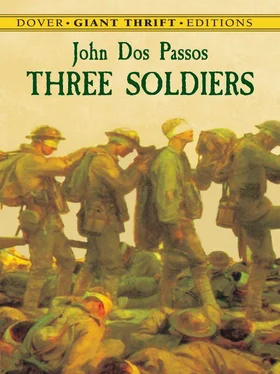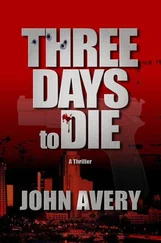“I wonder if you’ll remember me,” he said.
“You are the American who was in the Restaurant, Place du Tertre, I don’t remember when, but it was long ago.”
They shook hands.
“But you are alone,” said Andrews.
“Yes, I am always alone,” said the lame boy firmly. He held out his hand again.
“Au revoir,” said Andrews.
“Good luck!” said the lame boy. Andrews heard his crutch tapping on the pavement as he went away along the quai.
“Jeanne,” said Andrews, suddenly, “you’ll come home with me, won’t you?”
“But you have a friend living with you.”
“He’s gone to Brussels. He won’t be back till tomorrow.”
“I suppose one must pay for one’s dinner,” said Jeanne maliciously. “Good God, no.” Andrews buried his face in his hands. The singsong of the river pouring through the bridges filled his ears. He wanted desperately to cry. Bitter desire that was like hatred made his flesh tingle, made his hands ache to crush her hands in them.
“Come along,” he said gruffly.
“I didn’t mean to say that,” she said in a gentle, tired voice, “You know, I’m not a very nice person.” The greenish glow of the lamp lit up the contour of one of her cheeks as she tilted her head up, and glimmered in her eyes. A soft sentimental sadness suddenly took hold of Andrews; he felt as he used to feel when, as a very small child, his mother used to tell him Br’ Rabbit stories, and he would feel himself drifting helplessly on the stream of her soft voice, narrating, drifting towards something unknown and very sad, which he could not help.
They started walking again, past the Pont Neuf, towards the glare of the Place St. Michel. Three names had come into Andrews’s head, “Arsinoë, Berenike, Artimisia.” For a little while he puzzled over them, and then he remembered that Geneviève Rod had the large eyes and the wide, smooth forehead and the firm little lips the women had in the portraits that were sewn on the mummy cases in the Fayum. But those patrician women of Alexandria had not had chestnut hair with a glimpse of burnished copper in it; they might have dyed it, though!
“Why are you laughing?” asked Jeanne.
“Because things are so silly.”
“Perhaps you mean people are silly,” she said, looking up at him out of the corners of her eyes.
“You’re right.”
They walked in silence till they reached Andrews’s door.
“You go up first and see that there’s no one there,” said Jeanne in a business-like tone.
Andrews’s hands were cold. He felt his heart thumping while he climbed the stairs.
The room was empty. A fire was ready to light in the small fireplace. Andrews hastily tidied up the table and kicked under the bed some soiled clothes that lay in a heap in a corner. A thought came to him: how like his performances in his room at college when he had heard that a relative was coming to see him.
He tiptoed downstairs.
“Bien. Tu peux venir, Jeanne,” he said.
She sat down rather stiffly in the straight-backed armchair beside the fire.
“How pretty the fire is,” she said.
“Jeanne, I think I’m crazily in love with you,” said Andrews in an excited voice.
“Like at the Opéra Comique.” She shrugged her shoulders. “The room’s nice,” she said. “Oh, but, what a big bed!”
“You’re the first woman who’s been up here in my time, Jeanne… Oh, but this uniform is frightful.”
Andrews thought suddenly of all the tingling bodies constrained into the rigid attitudes of automatons in uniforms like this one; of all the hideous farce of making men into machines. Oh, if some gesture of his could only free them all for life and freedom and joy. The thought drowned everything else for the moment.
“But you pulled a button off,” cried Jeanne laughing hysterically. “I’ll just have to sew it on again.”
“Never mind. If you knew how I hated them.”
“What white skin you have, like a woman’s. I suppose that’s because you are blonde,” said Jeanne.
The sound of the door being shaken vigorously woke Andrews. He got up and stood in the middle of the floor for a moment without being able to collect his wits. The shaking of the door continued, and he heard Walters’s voice crying “Andy, Andy.” Andrews felt shame creeping up through him like nausea. He felt a passionate disgust towards himself and Jeanne and Walters. He had an impulse to move furtively as if he had stolen something. He went to the door and opened it a little.
“Say, Walters, old man,” he said, “I can’t let you in… I’ve got a girl with me. I’m sorry… I thought you wouldn’t get back till tomorrow.”
“You’re kidding, aren’t you?” came Walters’s voice out of the dark hall.
“No.” Andrews shut the door decisively and bolted it again.
Jeanne was still asleep. Her black hair had come undone and spread over the pillow. Andrews pulled the covers up about her carefully.
Then he got into the other bed, where he lay awake a long time, staring at the ceiling.
PEOPLE walking along the boulevard looked curiously through the railing at the line of men in olive-drab that straggled round the edge of the courtyard. The line moved slowly, past a table where an officer and two enlisted men sat poring over big lists of names and piles of palely tinted banknotes and silver francs that glittered white. Above the men’s heads a thin haze of cigarette smoke rose into the sunlight. There was a sound of voices and of feet shuffling on the gravel. The men who had been paid went off jauntily, the money jingling in their pockets.
The men at the table had red faces and tense, serious expressions. They pushed the money into the soldiers’ hands with a rough jerk and pronounced the names as if they were machines clicking.
Andrews saw that one of the men at the table was Walters; he smiled and whispered “Hello” as he came up to him. Walters kept his eyes fixed on the list.
While Andrews was waiting for the man ahead of him to be paid, he heard two men in the line talking.
“Wasn’t that a hell of a place? D’you remember the lad that died in the barracks one day?”
“Sure, I was in the medicks there too. There was a hell of a sergeant in that company tried to make the kid get up, and the loot came and said he’d court-martial him, an’ then they found out that he’d cashed in his checks.”
“What’d ’ee die of?”
“Heart failure, I guess. I dunno, though, he never did take to the life.”
“No. That place Cosne was enough to make any guy cash in his checks.”
Andrews got his money. As he was walking away, he strolled up to the two men he had heard talking. “Were you fellows in Cosne?”
“Sure.”
“Did you know a fellow named Fuselli?”
“I dunno… ”
“Sure, you do,” said the other man. “You remember Dan Fuselli, the little wop thought he was goin’ to be corporal.”
“He had another think comin’.” They both laughed.
Andrews walked off, vaguely angry. There were many soldiers on the Boulevard Montparnasse. He turned into a side street, feeling suddenly furtive and humble, as if he would hear any minute the harsh voice of a sergeant shouting orders at him.
The silver in his breeches pocket jingled with every step.
Andrews leaned on the balustrade of the balcony, looking down into the square in front of the Opéra Comique. He was dizzy with the beauty of the music he had been hearing. He had a sense somewhere in the distances of his mind of the great rhythm of the sea. People chattered all about him on the wide, crowded balcony, but he was only conscious of the blue-grey mistiness of the night where the lights made patterns in green-gold and red-gold. And compelling his attention from everything else, the rhythm swept through him like sea waves.
Читать дальше












